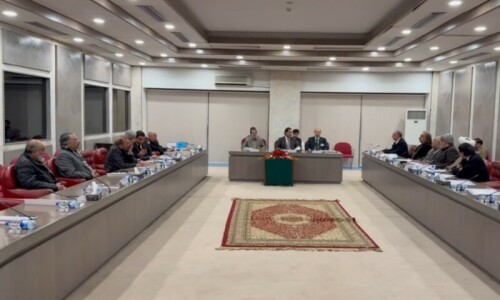PESHAWAR: Traditionally, Pakhtuns are foodies and fond of various beverages as well. Most of them love to cook different kinds of foods. Being industrious, they need more calories and require varieties of beverages to digest food.
They like simple and less spicy foods. Pakhtuns living in different areas are fond of various seasonal dishes, but some of these foods are evergreen and they love to enjoy them on all occasions.
A popular traditional food Painda or Sohbuth in southern parts of Khyber Pakhtunkhwa and Fata has recently gained widespread fame in northern areas too because of its peculiar taste and composition.
A number of outlets offering traditional Painda have sprawled out in and around Peshawar city over the last few years. Painda is not only the favourite dish of students but also local residents cherish it on parties, weddings, etc.
Salahuddin Marwat, 68, who runs a Painda restaurant at Dhobi Ghat near Peshawar University, told this scribe that composition of Painda used to be simple. Explaining about preparing Painda, he said that domestic chicken cooked in Desi ghee was strewn with small broken pieces of unfermented bread (chapatti), while pumpkin was used to make its soup more delicious. He said Marwats also offered Painda to guests on wedding ceremonies as a favourite food.
He said that now ghee, onion, garlic, ginger, lemon, tomato, potato and boneless chicken or beef steak were mixed in different spices which took four hours to cook.
He said it was served with salad, raita and pickle. He said local people placed orders for home pack Painda and a large number of university students visited his cafeteria daily. He said he charged around Rs130 per person. He said Painda was liked by people in north due to its simple and soft composition. “The flavour of Painda is relished now everywhere in KP and Fata .We should keep alive traditional foods as mark of our identity,” he maintained.
Wagma Siraj, a private university student in Peshawar and resident of Charsadda, told this correspondent that IDPs from southern districts and Fata also introduced their unique culture, including a peculiar flavour of poetry, dance, music and foods, wherever they went. She said that Painda was one of them. She said she went dining out to Saddar Bazaar every Monday evening for enjoying Marwat Painda along with her colleagues. “I have learnt cooking Painda, but still I need a master hand to cook it for guests at my home,” said Ms Siraj.
Internally displaced persons (IDPs) from Waziristan and adjacent areas of Dera Ismail Khan, Tank, Lakki Marwat, and Bannu are responsible for introducing and popularising this delicious cuisine in Peshawar and other areas. Marwat, Wazir and Bannuchi Pakhtun tribes take credit for traditional Painda. Some people call it Warra Marrai, Randa Cherga or Taodai in their own respective dialects.
Amjad Ali, an Islamia College University student and a resident of Mardan, said that he came to Dhobi Ghat to enjoy Painda along with his classmates.
He said that great rush was being seen, as students came from the university hostels to two Painda cafeterias located at Dhobi Ghat to dine out there . “Some of the students placed orders for their hostel rooms to entertain their private guests. “It is a delicious food, also good for a soft stomach,” he observed.
Painda is already there in most Pakhtun areas whether in south or northwest of KP and Fata, but with different names and cooking styles. Painda or Pund is a Pashto word which means ‘gathering’. Long ago, people used to cook Painda or a similar one dish for the entire family who would huddle in a circle round a big open ended dish called Khanak in local dialect to enjoy the most scrumptious food. In southern districts, Painda is available at restaurants in bazaars where local residents also offer it to guests.
Rahim Shah, a lecturer at a local college on Warsak road and resident of Bannu, remarked that Painda reflected mutual love and unity of family members typical of Pakhtun culture as all ate from one and the same dish.
Published in Dawn, March 13th, 2017















































Dear visitor, the comments section is undergoing an overhaul and will return soon.